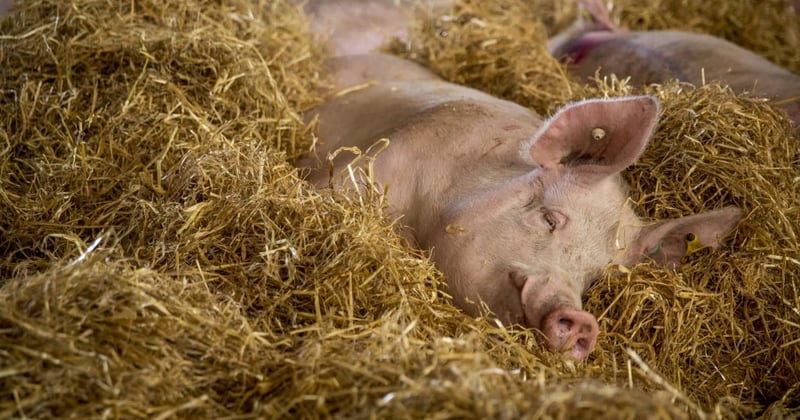
We call on big supermarket brands, around the world, to lead the way in raising pigs right.
News
Pigs are among the most intensively farmed animals on the planet, suffering at every stage of their lives. Sign our pledge and urge supermarkets to act now.
We’re calling for global, household names such as Walmart, Tesco and Carrefour to source pork from high welfare farms, or risk losing customers.
As demand for cheap pork continues to grow around the world, factory farming is working animals harder than ever.
These are some of the cruel factory-farming practices that lead to lifelong suffering of pigs:
- Three out of four mother pigs live in cages. Many of these pigs spend their lives in steel cages no bigger than a fridge, and are unable to turn around.
- They’re used as breeding machines, and their piglets are taken away just a few weeks after birth.
- Piglets are cruelly mutilated, often with no pain relief: their tails are cut, their teeth are ground or clipped, their ears are notched and most male piglets are castrated.
- Pigs are squashed together in dark, squalid warehouses, and are forced to lie in their own waste. These cramped, stressful conditions are the perfect breeding ground for infection, which leads to routine, indiscriminate use of antibiotics.
People care about pigs
Earlier this year, a series of international surveys revealed that 89% of supermarket shoppers would be willing to change where they shop if a supermarket commits to improving the lives of pigs.
We also found:
- 79% of New Zealanders found the harsh reality of industrial pig farming both here in NZ (with Farrowing Crates) and around the world (with varying Sow Stalls and Farrowing Crates) ‘upsetting’, ‘wrong’ or ‘shocking’,
- With only 3% of New Zealanders saying they would definitely still buy pork knowing that mother pigs are confined in cages, unable to move, when giving birth and rearing their young,
- 89% of US shoppers think that supermarkets have a responsibility to source pork from higher welfare standards – and that responsibility also applies to pigs reared overseas as well as in the US,
- 85% of people in China are willing to change where they shop and buy from supermarkets that commit to improving the lives of pigs instead,
- And eight out of ten people in Brazil, Thailand and Australia are concerned about the human health impact of routine use of antibiotics in farm animals.
Supermarkets must act
We’re calling on big supermarket brands, around the world, such as Tesco, Walmart and Carrefour to lead the way in raising pigs right.
Ben Pearson, Head of Campaigns at World Animal Protection NZ said: “It doesn’t have to be this way. We need to see an end to close confinement and barren environments, so pigs can live in social groups in comfortable environments with opportunities to express natural behaviour.
“Supermarkets hold the power to create better lives for pigs. We are encouraging customers of leading supermarkets, around the world, to let them know they expect higher welfare standards for pork products, with the guarantee that pigs are raised right.”
“It doesn’t have to be this way. We need to see an end to close confinement and barren environments, so pigs can live in social groups in comfortable environments with opportunities to express natural behaviour.